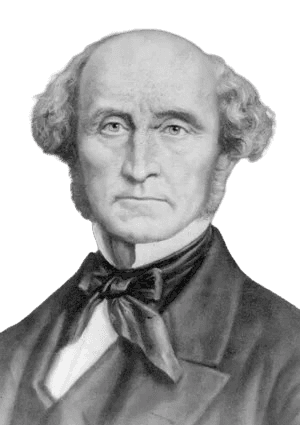Life and achievements
Early life
John Stuart Mill was born in London on May 20, 1806, to his mother, Harriet Barrow, and father, James Mill.
His father, James, was a Scottish historian, economist, and philosopher who had links with the utilitarianism movement spearheaded by Jeremy Bentham.
John’s education was rigorous, and he began learning at a very tender age.
Before the age of three, he was already being taught Greek, and by the age of eight, he was already studying Latin, algebra, and Euclid.
His father wanted to make John a great scholar; thus, he emphasized reason and science and did not bother much with religion.
Before he was twelve, he had learned history, political economy, and logic.
He also started reading the works of some famous classical liberals, including Adam Smith and David Ricardo.
Mill began to study philosophy more seriously at fifteen, one year after returning from France, following the empiricist and practical traditions of his father and Bentham.
But the level of his studies was very high, and at the age of twenty, Mill suffered from what he called a “mental crisis,” which meant that he began to doubt the meaning of the education he had received and the sense of his life.
He sought comfort in the poetry of the Romantics, especially Wordsworth, and their works assisted him in healing and enriching his understanding of the sensual and the beautiful in life.
Legacy
John Stuart Mill is one of the most significant philosophers who left his imprint on liberal political thinking, ethics, and reasoning.
His writings on freedom, individual rights, and Utilitarianism are still relevant in the contemporary world of philosophy and political science.
The “harm principle” Mill outlined in On Liberty is still relevant in the current discussions on free speech, the state's power, and personal Liberty.
His advocacy of free thinking and speech, especially in the face of opposition, has been instrumental in shaping contemporary democracies.
Mill’s contribution to Utilitarianism also affected the ethical theory in a significant manner.
From Bentham, Mill continued with Utilitarianism but with a difference in that he distinguished between higher and lower pleasures and held that the pleasures of the mind are better than those of the flesh.
This refinement enabled Utilitarianism to have a wider audience since it incorporated both the good and the bad, the tangible and the intangible aspects of happiness.
Mill’s work also contributed to the development of liberal feminism, especially with his advocacy for women’s rights in The Subjection of Women, where he advocated for women's equality in both the domestic and the public domain.
Besides the philosophical work, Mill’s activity in the Parliament was clear evidence of his concern for social and political change.
He supported measures that would enhance personal liberties, extend the franchise, and safeguard the rights of minorities.
His legacy is seen in his writings, and his thoughts remain relevant in contemporary society in addressing issues of Liberty, justice, and human rights.
Milestone moments
Feb 14, 1859
Publication of On Liberty
John Stuart Mill was a philosopher who published his most famous work, On Liberty, in 1859.
This work supported Liberty and individualism in society.
Mill presented the “harm principle,” which suggests that one should be allowed to do whatever they want as long as they do not hurt others.
This work has remained relevant to discussions of freedom of speech, individual Liberty, and the extent of governmental authority.
Mill’s argument for Liberty of thought, expression, and the individual in On Liberty remains relevant today and has become one of the most important texts for modern liberal democracies.
Jul 10, 1861
Publication of Utilitarianism
In 1861, Mill wrote Utilitarianism, which elaborated on the utilitarianism ethical theory that Bentham proposed.
Mill also clearly distinguished between higher and lower pleasures, stating that pleasures of the mind and virtues are better than pleasures of the flesh.
This work continues to be necessary to moral philosophy and influences debates about ethical theory and the place of happiness in action.
Mill’s version of Utilitarianism expanded the definition of pleasure and happiness, making the theory more appealing than Bentham’s version.
Aug 20, 1869
Publication of The Subjection of Women
In 1869, Mill published The Subjection of Women, in which he supported the idea of sexual equality and women’s rights.
According to Mill, women were oppressed, and granting them their rights would benefit society.
This work is one of the first and most significant pieces of literature of the Feminist movement.
It advocates for women’s right to vote.
Mill's views on women's rights are still considered one of the most significant contributions to the development of the theory of feminism, which defines the discussion of women’s rights to this day.
Oct 28, 1826
John Stuart Mill’s Mental Illness
Mill, at the age of twenty, had a severe “mental crisis” in which he doubted the value of the practical education that he had received and the very purpose of his life.
This crisis pushed Mill into a phase of self-reflection and finally influenced his thinking on the role of feelings, uniqueness, and happiness.
This was a significant crisis in Mill’s life, and he overcame it with the help of Romantic poetry, especially that of Wordsworth, which made him realize the importance of life's emotional aspect.
This period can be considered a turning point in Mill's life, as it caused him to change his focus and start searching for more philosophical ideas and self-fulfilment.
